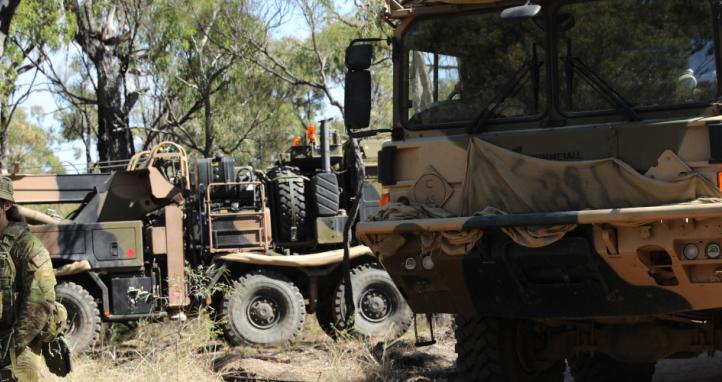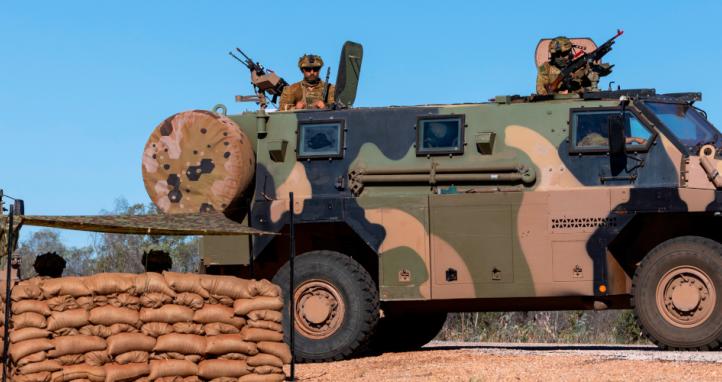'Moving into a formation headquarters can be a daunting task for anyone, including our other ranks. These tips are exactly what we want to be sharing with those who might be making such a move for the first time in the months ahead.'
– Brigadier Ben James, Director General Training and Doctrine
WO1 Jai Wright, HQ 16th Aviation Brigade – Avn Ops Senior Manager (AOSM)
Below are six tips that I offer to new Operations staff:
1. Software and applications. Formation headquarters use several different types of software applications for requesting, tracking, coordinating and capturing events. When posting to an administration position, particularly within a formation operations cell, it is imperative that you have an understanding and can confidently use these applications. You should use your initiative to gain the required qualifications and knowledge to use the applications relevant to your formation prior to commencing the appointment. Common applications and software used throughout all formations are:
- Army Capability Management System (ACMS) – All queries regarding the ACMS Training Schedule should be directed to the Capability Manager
- Army Compliance and Accountability Unit (ACAU) – Phone number available on the corporate directory.
- Training Area and Safety Management Information System (TASMIS) – Defence Protected Network (DPN) access only.
- Air Mobility Tasking and Control System (AMTACS).
- PMKeys Professional Development and Training (PD&T – Campus and face-to-face training required.
- Mercury – DPN access only.
- Adobe Pro/DC – online tutorials available.
- Microsoft suite – Various Campus courses.
2. Professional relationships and networking. Working in formation headquarters necessitates the requirements for relationships to be built down to your direct command units, sideways to other formations and up to the command headquarters. Networking is about having a group of contacts who you can help and provide support to, and who can help and provide support to you. Exploit your established social networks that are interlaced with the professional networks that you are required to shape. If possible organise face-to-face meetings with the key appointments that you will be engaging with. It will be beneficial if you have a ‘can-do’ attitude during the early stages of your appointment, as it will encourage those that are required to support you, to do the same. Building and maintaining professional relationships will result in many efficiencies and the importance of these relationships cannot be understated. Always be approachable and willing to provide assistance.
3. Writing. Working at formation headquarters requires you to be able to write quality documents in accordance with the Defence Writing Manual. Poorly written documents will reflect negatively on both you and your formation, thus it is essential that you can confidently develop a well written and appropriately structured document. Prior to commencing your posting, I recommend that you take full advantage of the online Campus courses (Essential Writing Skills – Foundation 00013312, Essential Writing Skills – Intermediate 00013313 and Essential Writing Skills - Advanced 00013314) and refresh your knowledge of the Defence Writing Manual located on the DPN Home page.. Another excellent resource that I use to assist me in writing is the Forces Command Defence Writing Aide-Memoire, this document is a brief summary of the information contained in the Defence Writing Manual, and it also has additional information on how to get the best use out of Microsoft Word, when formatting military documents.
4. Archiving and tracking. Working at formation headquarters will see you receive an exorbitant amount of correspondence; this will be via several different mediums. These documents are required to be managed in accordance with the Public Governance, Performance and Accountability Act 2013. You will be required to have outstanding organisation skills and excellent judgement to action these documents correctly and in a timely manner. I recommend that as soon as an email, signal or task order comes through, it is allocated to an appropriate member immediately, the initial document should be sent to that member and the source document archived in accordance with standard operating procedures. As a backstop, it is recommended that an overarching spreadsheet is used to capture all tasking, with weekly synchronisation conferences to ensure nothing slips through the cracks. These synch conferences should be used as reminders for both your formation and your direct command units. If a direct command unit has tasking/outputs due in the coming week, be proactive and provide them with a courtesy call reminding them – doing so will assist in ‘maintaining’ a positive relationship mentioned above whilst ensuring your formation meets higher command headquarters intent. Ideally, I do not leave at the end of the day until I have my personal and group/s email cleared, mercury cleared, ACMS allocated and documents released on Objective – this should be standard practice. Your archived documents should be easy for you/others to find in the future if needed.
5. Extra-regimental appointments. Working at formation headquarters provides you with an outstanding opportunity to champion for activities that can benefit the morale and well-being of soldiers at the unit level. These can include activities such as sports, wargaming, skill at arms competitions, shooting, adventure training or facilitating courses. I implore any member that is in a position to provide soldiers with opportunities such as these, to do so. Volunteer to take responsibility for an activity in an area that you are passionate about or interested in; take ownership and see the activity from concept through to fruition. Doing so will boost unit morale, enhance personal mental and physical qualities and allow soldiers respite in a relaxed social atmosphere away from unit stresses. The conduct of these activities can have indirect secondary positive influences on soldier productivity, retention and networking. Furthermore, employment at a formation headquarters may require you to conduct repetitive and mundane tasking for prolonged periods. Taking on this additional workload will be mutually beneficial to you as well as the soldiers, as it will break your often monotonous work cycle and assist in keeping you motivated throughout your posting tenure.
6. Personal Development – Study. Employment at formation headquarters generally offers a known yearly schedule and a higher level of stability than what is typically experienced during tenure at an operational unit. This provides you with an excellent opportunity to conduct further education; ideally the conduct of tertiary education should be investigated and undertaken. The Defence Assisted Study Scheme (DASS) is available to all permanent ADF members and ADF Reservists on continuous full time service (CFTS) provided the study is undertaken and completed during the period of CFTS. The DASS encourages members to undertake professional training and education throughout their career by providing financial support for approved study and professional development programs. Release from duty can also be accessed through Flexible Work Arrangements.
Another avenue for support of study is through the Army Tertiary Education Program (ATEP). The ATEP provides an opportunity for WOs and SNCOs, who do not possess an undergraduate degree, to undertake sponsored part-time study in selected courses at participating universities. Sponsored ATEP programs offer advanced standing entry – generally up to 2 years of a 3 year degree. This advance standing allows the successful applicant to gain a bachelor’s degree studying, part time during one posting cycle. I strongly recommend that SNCOs and WOs have a professional goal to complete tertiary education whilst undertaking a posting at a formation headquarters. (further information can be found at the links below – DPN access only)
- DASS
- ATEP
Below are four tips that I offer to new Operations staff:
- Handover Brief. I had arranged a Handover brief with my gaining unit but my losing unit did not allow me to attend the Handover. I was not able to arrange an alternative time, so marched into my new unit with limited understanding of the new role. Losing supervisors should allow time for departing personnel to attend a Handover.
- Appropriate Access/Permissions to Management Systems. During the handover Brief, incoming personnel can identify what management systems are required to perform the new job. This will allow the correct access/permissions to be requested prior to arriving in the unit or soon after arrival if your PMKEYS profile needs to reflect the requirement.
- Garrison Tour. Performing an Operations staff role is more than an office-bound management and planning job. Often the local knowledge to understand Garrison functioning is handy and knowing the key stakeholders can greatly enhance consultation and collaboration. These issues can be identified during a tour of the Garrison and local area. Get a tour of the base and what areas you will need to know about.
- Know your Work Colleagues. Get a list of the current, remaining and incoming Operations staff during your Handover brief. This allows you to be aware of the team you will be part of as well as who supervisors and managers will be.










In particular, the understanding and competence on the systems recommended is a highly effective way of assisting and understanding the general flow of information and tasks within the HQ. This also helps to develop your own understanding of the wider Army and Defence Force. The more systems that you are competent on, regardless of whether they are required for your specific role or lane, help to provide redundancy within the HQ while also being a benefit to your own personal development.
ACMS, TASMIS and Mercury from my own experiences are often poorly understood, and sometimes poorly used. By developing your own skills on these tools and becoming an SME on how they function in the wider context of Defence, the ability of the HQ to function effectively is increased while you have developed your own understanding for future positions outside of the HQ role.
As a HQ (Comd and staff), it is important that we fight to ensure the processes we do in barracks are the same processes we do in the field (and vice versa). Now, this wont always be possible due to myriad of reasons; however, it should be what headquarters' aspires to achieve.
Having different 'field' and 'barracks' ways of executing C3 processes is inefficient.